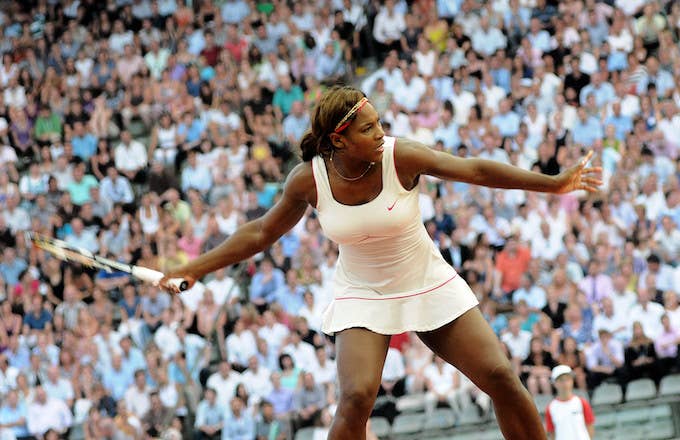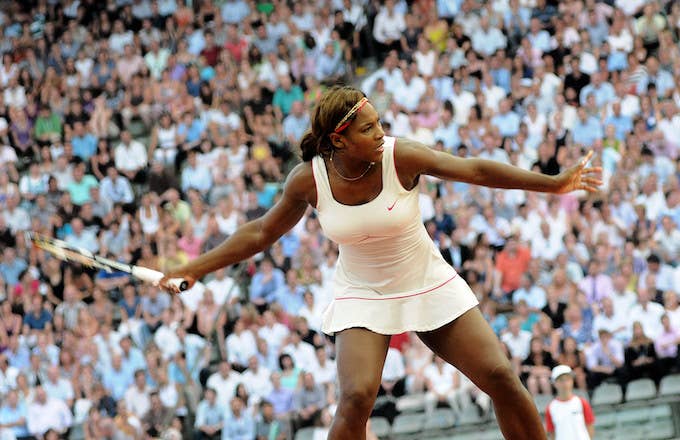
We're not yet three months removed from the 2018 U.S. Open, but it feels like eons ago. With all that's happened in the interim, the tennis feels like an afterthought. Naomi Osaka won; Serena Williams lost. Except, it was more than that after Serena, being Serena—the brash, outspoken champion older, male sportswriters sputter to comprehend—had the temerity to speak up after chair umpire Carlos Ramos docked her for multiple infractions before eventually giving her a game penalty over verbal abuse. Williams addressed the controversial final in a new GQ feature.
Her tone is conciliatory, at first, like time has sanded the edges off the ordeal. "I've had a lot of things happen to me at the U.S. Open," she tells the magazine. "I think about three or four different things. Especially in the later rounds. I think a person can be a little bit more sensitive to anything in that moment. You know, it becomes a trigger moment. When you go through a really extreme ordeal not once, not twice, not three times, it becomes a trigger moment."
She's definitely had a history at the Queens-based tennis major. There was a called foot fault in her semifinal loss to Kim Clijsters in the 2009 semifinal, which again led to a point penalty after she disputed the call following an earlier warning when she broke her racket. Two years later, she got into it with another chair umpire, Eva Asderaki, and refused to shake her hand after the match. So, yeah, it's a trigger moment. She's handled the ensuing months after this year's Final the way most of us would if we had been in her position, by tuning the rest of the world out.
"I don't really remember how it went, to be honest," she says. "I've been purposely not thinking about it." She deleted social-media apps from her phone and says she doesn't watch TV at all. "I try to keep myself in a bubble as much as I can. I just don't want to be involved in other people's opinions. Let them live how they want to feel."
She does, however, make one thing clear about that night and the events that precipitated a million think pieces, including more than a few from white male sportswriters tsk-tsking her for losing control of her emotions (far superior columns were also published on deadline). It was the initial coaching code warning Ramos assessed early in the second set that Williams wanted to explain to GQ readers:
She would like to make one thing clear about Ramos hitting her with the coaching code violation. It wasn't typical. Usually, if an umpire notices a player's coach making suspicious movements (in tennis, coaches are not allowed to, well, coach during the match), he'll simply say something to the player and that's the end of it.
"That was where a lot of people don't understand. That's where I was coming from. Like, usually you talk to me, tell me that something's happening, and I'll tell my box, like, whatever you're doing, don't. First, I can't see you—I'm clear on the other side of the court. Second, don't do it. We're here to win or to lose with dignity, and that's how I've always done my career."
To be accused of cheating, and eventually docked a point for it, was an injustice. "That is not right," she told the referee repeatedly. "And you know it. And I know you can't admit it, but you know it. That's not right."
A few weeks after Williams was lambasted for her emotional response to Ramos' point deduction, Brett Kavanaugh was confirmed to the Supreme Court following an angry, unhinged testimony where he cried and called credible assertions of sexual assault a liberal, Clinton-ian conspiracy against him.
"Kavanaugh's a white man," Serena tells GQ when asked about anger and who gets to express it in public. "I'm a black woman. His limit is higher. My limit is way lower. And that's where we stand right now in this world. And it's a fact. It is literally a fact. If you don't believe anything I say, just look at those two examples."


